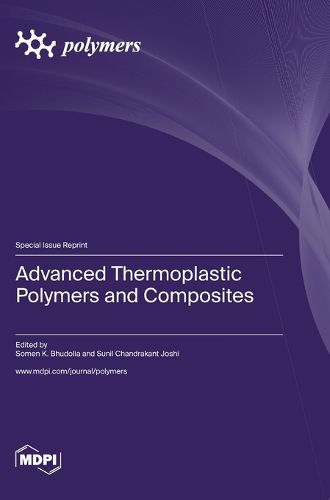Readings Newsletter
Become a Readings Member to make your shopping experience even easier.
Sign in or sign up for free!
You’re not far away from qualifying for FREE standard shipping within Australia
You’ve qualified for FREE standard shipping within Australia
The cart is loading…






This title is printed to order. This book may have been self-published. If so, we cannot guarantee the quality of the content. In the main most books will have gone through the editing process however some may not. We therefore suggest that you be aware of this before ordering this book. If in doubt check either the author or publisher’s details as we are unable to accept any returns unless they are faulty. Please contact us if you have any questions.
In the last decade, design and material innovations for manufacturing composites have reached new heights. Thermoplastic polymers and their composites have become the most in-demand materials in recent times as they provide numerous advantages over thermoset composites. Thermoplastic polymers have a high damage tolerance, high impact resistance, recyclability, formability, weldability, repairability, and cost-effectiveness compared with thermoset composites. Thermoplastic polymers and composites are widely used in automotive, aerospace, electrical and electronics, industrial, and medical applications. Thermoplastic composites are estimated to grow from USD 28.0 billion in 2019 to USD 36.0 billion by 2024. High-performance thermoplastic materials are used in conjunction with a multitude of manufacturing processes like injection moulding, thermoforming, prepreg, liquid injection processes, automated tape placement, filament winding, pultrusion, additive manufacturing, and other processes. The material limits, design, and assembly requirements, as well as the processing constraints, are significantly important for the realisation of novel product development using a manufacturing process by simultaneously optimising reliability, safety, and other performance-related issues. The current thermoplastic material systems and manufacturing techniques still have plenty of room for optimisation and advancement. This reprint presents the latest scientific and technical advances in thermoplastic materials and their composites, processing, characterisation, product development, and manufacturing process parameter optimisations.
$9.00 standard shipping within Australia
FREE standard shipping within Australia for orders over $100.00
Express & International shipping calculated at checkout
This title is printed to order. This book may have been self-published. If so, we cannot guarantee the quality of the content. In the main most books will have gone through the editing process however some may not. We therefore suggest that you be aware of this before ordering this book. If in doubt check either the author or publisher’s details as we are unable to accept any returns unless they are faulty. Please contact us if you have any questions.
In the last decade, design and material innovations for manufacturing composites have reached new heights. Thermoplastic polymers and their composites have become the most in-demand materials in recent times as they provide numerous advantages over thermoset composites. Thermoplastic polymers have a high damage tolerance, high impact resistance, recyclability, formability, weldability, repairability, and cost-effectiveness compared with thermoset composites. Thermoplastic polymers and composites are widely used in automotive, aerospace, electrical and electronics, industrial, and medical applications. Thermoplastic composites are estimated to grow from USD 28.0 billion in 2019 to USD 36.0 billion by 2024. High-performance thermoplastic materials are used in conjunction with a multitude of manufacturing processes like injection moulding, thermoforming, prepreg, liquid injection processes, automated tape placement, filament winding, pultrusion, additive manufacturing, and other processes. The material limits, design, and assembly requirements, as well as the processing constraints, are significantly important for the realisation of novel product development using a manufacturing process by simultaneously optimising reliability, safety, and other performance-related issues. The current thermoplastic material systems and manufacturing techniques still have plenty of room for optimisation and advancement. This reprint presents the latest scientific and technical advances in thermoplastic materials and their composites, processing, characterisation, product development, and manufacturing process parameter optimisations.